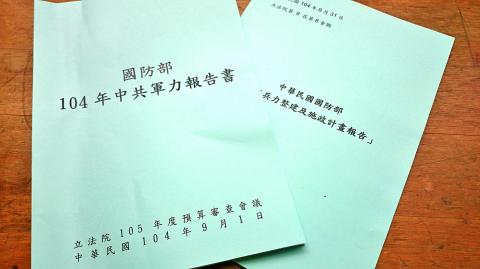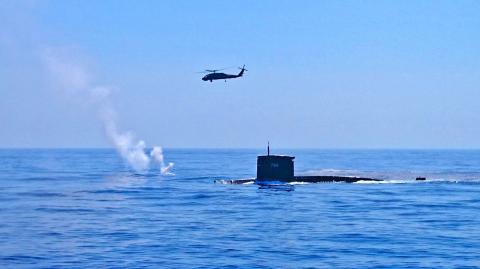China continues to target Taiwan for attack and invasion in the event of conflict, and Beijing is likely to declare a South China Sea air defense identification zone (ADIZ) in the near future to bolster its claim on the islets and reefs in the region, the Ministry of National Defense (MND) said.
According to MND reports released yesterday, Beijing convened high-level meetings to re-evaluate its cross-strait policies following last year’s Sunflower movement and related protests by Taiwanese against the government’s move to force a cross-strait service trade agreement with China through the legislature.
The report said China is concerned about the outcome of Taiwan’s presidential and legislative elections in January next year, and its People’s Liberation Army (PLA) has therefore conducted a series of military drills in recent months simulating an invasion of Taiwan, known as “Operation Decapitation,” in which airborne paratroopers and special forces practiced descending on the Presidential Office Building in Taipei City in a rapid assault.

Photo: Lo Tian-pin, Taipei Times
Outlining China’s plans for attack against Taiwan, the report said Beijing would first use a combination of military threats and actions to intimidate Taiwanese, then blockade major ports of the nation’s frontier islands, such as Kinmen, Matsu and other outlying maritime territories.
After that, PLA missiles and other firepower would be deployed to attack Taiwan’s major military and political headquarters, along with telecommunications infrastructure, which would be followed by mounting airborne and amphibious landings for an invasion.
The report said the possible scenarios for a Beijing attack could arise from situations such as Taiwan’s declaration of independence or heading unequivocally toward independence, acquisition of nuclear weapons, internal political turmoil, delaying of dialogue on cross-strait negotiations toward unification, foreign forces interfering in Taiwan’s internal affairs, or deployment of foreign troops in the country.

Photo: Lo Tian-pin, Taipei Times
The ministry said Taiwan’s armed forces are capable of defending the nation, and would undertake drills to simulate a defense of the Presidential Office Building and the greater Taipei area, in what is dubbed “Counter-Operation Decapitation,” during the yearly Han Kuang military exercises, which are scheduled to take place next week.
In the past few days, marine amphibious units together with other special forces troops have been seen conducting drills along coastal regions and shores of the Tamsui River (淡水河) in northern Taiwan, while the military police brigade tasked with maintaining the security of the Presidential Office Building have also been training to defend against a potential attack.
The report concluded that China’s island-building spree in the South China Sea has completely changed the strategic structure in the region, adding that China has stepped up militarization and to claim sovereignty while exploring deposits of oil, hydrocarbons and other natural resources.
China has begun reclamation work on seven reefs and is undertaking construction of a seaport, airport runways and other infrastructure facilities, the report said.
Additional reporting by CNA

NATIONAL SECURITY THREAT: An official said that Guan Guan’s comments had gone beyond the threshold of free speech, as she advocated for the destruction of the ROC China-born media influencer Guan Guan’s (關關) residency permit has been revoked for repeatedly posting pro-China content that threatens national security, the National Immigration Agency said yesterday. Guan Guan has said many controversial things in her videos posted to Douyin (抖音), including “the red flag will soon be painted all over Taiwan” and “Taiwan is an inseparable part of China,” while expressing hope for expedited “reunification.” The agency received multiple reports alleging that Guan Guan had advocated for armed reunification last year. After investigating, the agency last month issued a notice requiring her to appear and account for her actions. Guan Guan appeared as required,

A strong cold air mass is expected to arrive tonight, bringing a change in weather and a drop in temperature, the Central Weather Administration (CWA) said. The coldest time would be early on Thursday morning, with temperatures in some areas dipping as low as 8°C, it said. Daytime highs yesterday were 22°C to 24°C in northern and eastern Taiwan, and about 25°C to 28°C in the central and southern regions, it said. However, nighttime lows would dip to about 15°C to 16°C in central and northern Taiwan as well as the northeast, and 17°C to 19°C elsewhere, it said. Tropical Storm Nokaen, currently

PAPERS, PLEASE: The gang exploited the high value of the passports, selling them at inflated prices to Chinese buyers, who would treat them as ‘invisibility cloaks’ The Yilan District Court has handed four members of a syndicate prison terms ranging from one year and two months to two years and two months for their involvement in a scheme to purchase Taiwanese passports and resell them abroad at a massive markup. A Chinese human smuggling syndicate purchased Taiwanese passports through local criminal networks, exploiting the passports’ visa-free travel privileges to turn a profit of more than 20 times the original price, the court said. Such criminal organizations enable people to impersonate Taiwanese when entering and exiting Taiwan and other countries, undermining social order and the credibility of the nation’s

‘SALAMI-SLICING’: Beijing’s ‘gray zone’ tactics around the Pratas Islands have been slowly intensifying, with the PLA testing Taiwan’s responses and limits, an expert said The Ministry of National Defense yesterday condemned an intrusion by a Chinese drone into the airspace of the Pratas Islands (Dongsha Islands, 東沙群島) as a serious disruption of regional peace. The ministry said it detected the Chinese surveillance and reconnaissance drone entering the southwestern parts of Taiwan’s air defense identification zone early yesterday, and it approached the Pratas Islands at 5:41am. The ministry said it immediately notified the garrison stationed in the area to enhance aerial surveillance and alert levels, and the drone was detected in the islands’ territorial airspace at 5:44am, maintaining an altitude outside the effective range of air-defense weaponry. Following